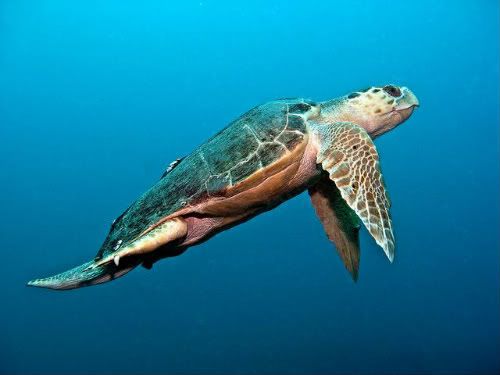every day, mostly invisible to us.
Many of them are happening in the ocean,
way down deep, those strange fluorescent creatures,
delicate as paper, ancient as turtles.
The life of the loggerhead turtle,
the sea turtle, is a miracle.
Buried alive, born in sand,
no larger than a child's hand,
its journey begins in danger.
Soft-shelled, it makes its
perilous trek from land to sea,
running from crabs and gulls.
Half of them do not make it.
And when they do, as newborns,
they must swim 70 miles to the Gulf Stream,
where perhaps they will find a life raft
of seaweed to bear them north.
But perhaps it will drift off course,
into the wide Sargasso Sea,
a purgatory of no current, no wind,
a wasteland of oil and trash.
But, in the lifespan of a turtle,
a few lost years are okay, even normal.
Perhaps it will make its way back
to the Gulf Stream, with its in-born
magnetic map of the ocean.
A loggerhead is, in fact, never really lost.
It carries the genetic memory
of its ancestors, millions of years.
It knows what to do.
It knows, for example,
to find its way to the Caribbean,
where it will wait for 15 years,
after which something inside it
will compel it to move along,
its purpose being elsewhere.
The loggerhead turtle
is capable of being alone for years,
just swimming and eating,
guided by the earth's magnetism
and millions of years of memory,
its inheritance.
It knows where,
in the vastness of the ocean,
to find a mate, one mate.
It knows, after 20 years or so,
how to find the shore where it was born,
to lay new eggs,
and start the whole cycle over again.
It knows these things with a brain
the size of a walnut.
This is a miracle.
At this point, arguments about
creation and evolution
collapse into irrelevance.
The turtle doesn't know how to argue.
It knows how to live,
with a tenacity and fearlessness
and grace that I will never know.
This is a miracle.
In some ways, in a lot of ways,
I envy the loggerhead turtle.
It goes through its life with unflagging purpose.
It knows, by heart,
when to swim like hell,
and when to wait for 15 years
in a kelp bed.
It knows how to listen
to the stillness of its own inner purpose.
And me, writing alone on a couch
at my parents' house,
my head messy with depression,
asking myself: What am I supposed to do?
My brain is like 15 times bigger
than the loggerhead's,
and yet I fumble around
and fuck up and live
in a haze of confusion,
unable to answer the question
a fucking sea turtle
doesn't even need to ask:
What am I supposed to do?
But I will not end the poem there,
because, messy head or no,
I still believe in miracles.
For I am also like the loggerhead.
I know how to listen to the stillness
of my heart, even when I have drifted
into the oily trashy wide Sargasso Sea.
I know that it is okay to wait,
sometimes for a very long time.
I know that it is sometimes appropriate
to swim like hell,
and sometimes it is appropriate
to ride a seaweed raft for a thousand miles,
or take refuge under a quilt
sewn by my grandmother
before I was born,
my inheritance.
I know to trust that thing inside me
(call it evolution/fate/soul/heart)
that compels me to keep going,
that I have many miles to swim,
many places to see,
creatures to encounter,
and a largely unspoken/invisible purpose
that is no less real
than my flesh and bones.
The loggerhead is totally okay
swimming alone for thousands of miles,
into the abyss of the Atlantic.
Other travelers will cross its path,
other strange wanderers,
each with its own journey and purpose
that has something to do with
its ancestors and with the future.
The loggerhead can survive
the cold of the arctic seas
and the warmth of the Caribbean.
Its heart is adaptable.
The loggerheads outlived the dinosaurs,
took refuge in the ocean
when the world burned and then froze.
They are the ancient ones,
who are guided on their journey
by the same invisible power
that turns northern skies
to green fire, the aurora borealis.
Humans and loggerheads have similar lifespans,
but turtles predate us by ages.
Humans are, geologically speaking,
relative newcomers to this planet,
still fumbling around
and fucking things up.
We haven't yet established
that invisible inner map
that guides the loggerhead.
We spill oil in the ocean;
the loggerhead holds its breath
and swims to friendlier waters.
We dip nets in the ocean;
The loggerhead grimaces and swims on.
It has seen worse threats, much worse.
Given such a humanity,
how do I resolve the poem?
There is no resolution, I suppose,
except quiet wonder at the loggerhead,
and the comfort derived
from such ancient miracles.

